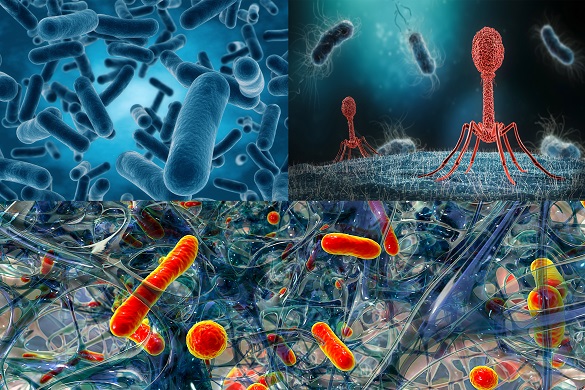The University of Liverpool is a core partner in a new Innovate UK-funded Microbials (Microbiome, Biofilms & Phage) Accelerator that is now accepting applications from SMEs for a programme of support to help scale their businesses and secure funding for the commercialisation of innovative microbial technologies.
The University of Liverpool’s Microbiome Innovation Centre and the Open Innovation Hub for Antimicrobial Surfaces are part of a consortium providing core expertise for the Microbials Accelerator which is co-led by LYVA Labs and Bionow. Other partners include iiCON, CPI and the Innovation Agency.
Funded as part of the Biomedical Catalyst, the programme consists of a unique package of business support and access to clinical, scientific, technical and commercial advice at no cost to the company.
The scope for the Microbials Accelerator includes technologies, products, processes, and services that have the potential to impact microbial communities or biofilms related to health, including new technologies to protect beneficial microbiomes or to control harmful microbial communities or biofilms.
The Microbials Accelerator partnership offers a programme of developmental courses and mentorship opportunities. The programme is designed to give businesses the knowledge and support they need to move products and services from the development stage to market readiness.
Commenting on the programme, Lorna Green, CEO of LYVA Labs, said: “The Liverpool City Region has a key strength in microbial research and development. This new microbial accelerator will help us capitalise on the unique academic research, facilities, industry partners, and growing ecosystem in our region, enabling us to incubate and support upcoming talent and real-world solutions.”
The University of Liverpool provides key scientific and translational leadership in Biofilms, Microbiomes and Phage-based approaches.
Professor Steve Paterson, University of Liverpool Director of Microbiome Innovation Centre, and Professor Rasmita Raval Director of the Open Innovation Hub for Antimicrobial Surfaces and Co-Director, National Biofilm Innovation Centre, said: “The University of Liverpool has world-leading expertise and unique facilities in the analysis of microbiomes and biofilms, which we study from the nanoscale to microbial communities. New technologies have revolutionised the microbial field and so we are excited by the opportunity to use these insights to support emerging businesses in Liverpool and nationally.”
Geoff Davison, CEO of Bionow, added: “Research into the relationship between microbes, their hosts, and the environment, could hold the key to vital solutions to some of society’s biggest health challenges. This programme will help SMEs and startups to get their innovations to market with the potential to transform treatments and health outcomes across a wide range of health sectors.”
Further details on the Microbial Accelerator can be found here. The deadline for SME applications closing is midday on 6 June and completed applications should be sent to microbialsaccelerator@bionow.co.uk.
